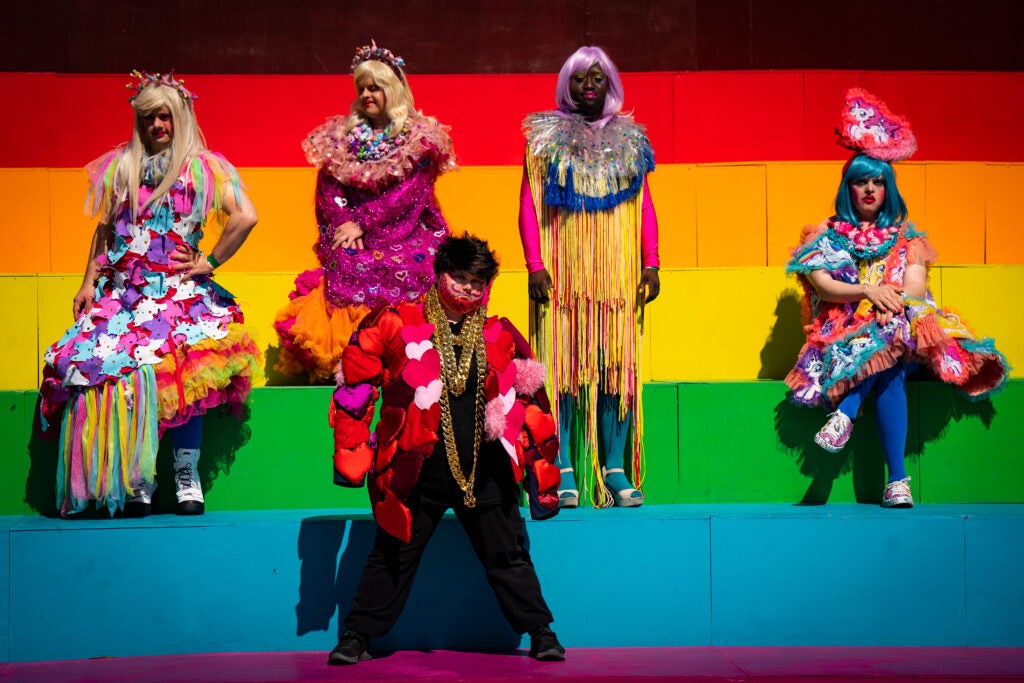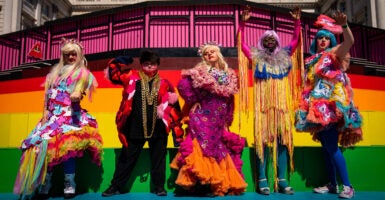Advocates have long fought for people with Down syndrome to be treated with dignity and love, and to be given opportunities that help them thrive as independently as possible. But in the United Kingdom, one group has sparked global outrage for costuming, choreographing, and celebrating “Drag Syndrome,” a troupe of people with Down syndrome dancing in drag in the name of “expression.”
“Drag Syndrome” is a production by the dance choreography group, Culture Device, described as a “drag collective featuring highly addictive queens & kings with Down-Syndrome.” Its patron is Robert Wyatt and its creative director is Daniel Vais.
“Sometimes drag is an idea that you want to communicate,” claims Vais in a hotly criticized mini-documentary put out by Mashable. Titled “Born To Dance With An Extra Chromosome,” the mini-documentary shows several people with Down Syndrome putting on dresses, applying makeup, and then dancing on stage amid the screams of the audience.

A baby born with Down syndrome has an extra chromosome that changes how that baby develops both physically and mentally. Most children with Down syndrome hit developmental stages much later than their peers, such as learning to walk and talk. Many people with Down syndrome need both medical and familial support as adults, though some people with Down syndrome may take college classes, and many hold jobs.
Though advances in medicine have increased the expected lifespan of a person with Down syndrome from 25 years in 1980 to 65 years in 2023, expanded screening options during pregnancy have tragically resulted in a drastic number of parents aborting their unborn babies who have Down syndrome.
Life advocates, and people with Down syndrome themselves, argue that having an extra chromosome should not be a death sentence — and that every person with Down syndrome’s life is worth living.
One 2011 study found that almost 99% of people with Down syndrome are happy with their lives, 97% like who they are, 96% like how they look, 99% express love for their families, and many encouraged parents to love their babies with Down syndrome, “mentioning that their own lives were good.”
Drag Syndrome
Vais claims he wants individuals with Down syndrome to be able to express themselves. But his drag troupe has sparked concerns that the performers, many of whom dance under sexual names, are being exploited.
Drag Syndrome denies these claims.
“Drag is taking over the world anyway. Also people with learning disabilities or Down’s syndrome, have a lot to say, and a lot of talent. So if [audience members] come and watch it and experience it – it’s good for them,” he said in the Mashable interview.
Vais was not available for comment, but spokesman Peter Wilson told The Daily Signal that Vais first worked with people with Down Syndrome in Ireland about a decade ago, when he set up a contemporary dance troupe. Vais later started a group called “Culture Divide” in London, which involves a lot of projects that feature disabled people, and he came up with the idea for Drag Syndrome with British actress Sarah Gordon, Wilson said, adding that Gordon “decided Drag wasn’t really her thing” and dropped out of the venture.
“Some of them are gay and some are not,” Wilson explained of the individuals with Down syndrome in the troupe. “It’s about 50/50 actually. And the performances themselves are…not at all sexual. They’re not old fashioned drag where you get guys trying to look like tall beautiful blonde women. Their bodies aren’t suited for that. And they have their own concept. It’s a style called ‘alt drag.'”
Wilson claimed that this style is more grungy and edgy rather than “standing there trying to look like a beautiful woman with her boobs hanging out.” The men and women in the troupe come up with their own name and their own style and their own character, he insisted.
Vais will help the performers “express the character that they’re trying to put across,” Wilson said, asked if Vais tells the troupe what to do, wear, and say.
‘Man Eater by Day’
Those characters are quite something, and “Drag Syndrome” proudly displays the profiles of its artists on the troupe’s website. Several of their descriptions include overtly sexual language.
The first is Horrora Shebang, pictured in a velvet dress with gaudy makeup, curls, and prominently displayed chest hair, described by the organization as “a very super major B—- in many hoods around the world,” and “a man eater by day and a film maker by night.”
Justin Bond is “a multi-talented, handsome King” described by Drag Syndrome as “King Justin Bond if you’re NASTY!”
“He can sing, he can dance, he can love you till the end of time,” the website says.
Lady Francesca is another member of the drag queen troupe described as “one of the fiercest queens around.”
“She is bossy, she is wild and she knows how to make audiences go wild,” the website claims. “She is known for her stunning looks and kind spirit but please don’t cross her way, she might bite!”
Lady Mercury is depicted on the Drag Syndrome website with light greenish-blue skin paint, a blue wig, heavy makeup, and an armor-like costume. Lady Mercury’s description also includes sexual language: “She is fierce, intelligent and powerful queen. Dedicated to her work, Lady Mercury can make you gag for more… Her moves are always on point and she’s turning heads wherever she goes. She adore[s] her loving fans and can surprise you with her witt and sass.”
Other members of the drag troupe include Davina Starr, Nikita Gold, Gaia Callas, Frozita Honkong, George the Lord, and Gymma Black — who “does black magic.”
According to Wilson, Drag Syndrome is not a “hugely profitable enterprise” for Vais. Wilson claimed most of the money goes to productions and costumes. The performers do get paid (he refused to divulge how much) though he did note that if people with Down syndrome are receiving government benefits and they take an income, they can lose their benefits.
“No one is pushing for money, basically, and none of them are in it for money,” he said. “They are in it for art.”
‘Exploitation of Vulnerable People’
The group began gaining more international attention when detransitioner Oli London highlighted several of the drag performers on Twitter.
“This vulnerable person with Down Syndrome is seen performing on stage in fetish gear and holding a whip at an LGBT Club in Oslo, Norway,” London tweeted on April 7, showing a picture that Wilson identified as “Horrora Shebang.”
“This vulnerable man is part of ‘Drag Syndrome’ a UK based Drag Company where people with Down syndrome perform in LGBT nightclubs around the world as Drag Queens,” London said. “This is exploitation of vulnerable people!”
Asked about the depiction of a “Drag Syndrome” performer with a whip, Wilson claimed he had never seen such a picture. When he was presented with the photo, he denied that it was sexual and said that it was “massively unrepresentative and out of context,” criticizing London for discussing the performers without ever having attended one of their drag shows.
Wilson also said he had been to many of the shows and had never seen any kind of whips or fetish materials. He both denied that the performers were being sexualized and emphasized that they are adults who enjoy sexual relationships.
“They’re adults,” he said. “They like to have sex. They want to have partners. They want to have relationships … we are not talking about children.”
Asked to explain whether Horrora Shebang is a reference to “banging” — or engaging in sexual activity — Wilson said “yeah, that is obviously what the word means, but it’s a made up name” linked to the Rocky Horror Picture Show.
London also accused Drag Syndrome of exploiting these individuals with Down syndrome for profit.
“These vulnerable people with Down Syndrome are part of a UK Drag Company that dresses them as Drag Queens and parades them on stages in LGBT nightclubs across the world,” he wrote. “This is pure EXPLOITATION. These people are being exploited for profit and to push the Trans Agenda!”
Pink News ran a story highlighting what it described as a “brilliant response” to London’s criticisms. The story features a variety of Drag Syndrome’s tweets with captions such as “You can not erase us!!!!! We are here! Hello” and “We are GOLDEN. Don’t be jealous!”
Drag Syndrome has accrued a lot of positive United Kingdom press as the troupe has performed over the years. They have been covered by British Vogue, BBC Stories, the Evening Standard, and more.
Wilson said that their reception in the U.S. has not been so positive — members of the Grand Rapids, Michigan community were reportedly horrified and concerned that Drag Syndrome was exploiting its members, and then Republican congressional candidate Peter Meijer refused to allow the group to perform at his venue (Meijer served as a representative for Michigan’s 3rd congressional district from 2021 to 2023).
“I have been called a bigot, an ableist, a homophobe and a transphobe,” Meijer told the New York Times in 2019. “I fundamentally don’t understand how someone can take my very good faith concern about the potential for exploitation and spin that into discriminating against people with a disability.”
The controversy comes as Americans push back against “Drag Queen Story Hours” and drag performances for children. In Tennessee, Republican Gov. Bill Lee just signed legislation banning sex change surgeries for children and banning children from attending sexually explicit drag shows in the state.
Have an opinion about this article? To sound off, please email [email protected] and we’ll consider publishing your edited remarks in our regular “We Hear You” feature. Remember to include the url or headline of the article plus your name and town and/or state.































